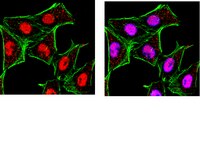Haploinsufficiency for BRCA1 leads to cell-type-specific genomic instability and premature senescence.
Sedic, M; Skibinski, A; Brown, N; Gallardo, M; Mulligan, P; Martinez, P; Keller, PJ; Glover, E; Richardson, AL; Cowan, J; Toland, AE; Ravichandran, K; Riethman, H; Naber, SP; Näär, AM; Blasco, MA; Hinds, PW; Kuperwasser, C
Nature communications
6
7505
2015
Mostrar resumen
Although BRCA1 function is essential for maintaining genomic integrity in all cell types, it is unclear why increased risk of cancer in individuals harbouring deleterious mutations in BRCA1 is restricted to only a select few tissues. Here we show that human mammary epithelial cells (HMECs) from BRCA1-mutation carriers (BRCA1(mut/+)) exhibit increased genomic instability and rapid telomere erosion in the absence of tumour-suppressor loss. Furthermore, we uncover a novel form of haploinsufficiency-induced senescence (HIS) specific to epithelial cells, which is triggered by pRb pathway activation rather than p53 induction. HIS and telomere erosion in HMECs correlate with misregulation of SIRT1 leading to increased levels of acetylated pRb as well as acetylated H4K16 both globally and at telomeric regions. These results identify a novel form of cellular senescence and provide a potential molecular basis for the rapid cell- and tissue- specific predisposition of breast cancer development associated with BRCA1 haploinsufficiency. | 26106036
 |
Inhibition of SUV39H1 methyltransferase activity by DBC1.
Li, Zhenyu, et al.
J. Biol. Chem., 284: 10361-6 (2009)
2009
Mostrar resumen
SUV39H1 is a histone H3K9-specific methyltransferase important for heterochromatin formation, regulation of gene expression, and induction of senescence in premalignant cells. SUV39H1 forms a complex with SirT1, and its activity is stimulated by SirT1 binding. Here we present evidence that the product of the DBC1 (deleted in breast cancer 1) gene disrupts the SUV39H1-SirT1 complex. Furthermore, DBC1 binds to the SUV39H1 catalytic domain and inhibits its ability to methylate histone H3 in vitro and in vivo. Knockdown of endogenous DBC1 increased the level of cellular H3K9 methylation. As expected, DBC1 also binds to SirT1 and inhibits the deacetylase activity of SirT1. These results identify DBC1 as a novel cellular inhibitor of SUV39H1 activity. DBC1 may be an important regulator of heterochromatin formation and genomic stability by disrupting the SUV39H1-SirT1 complex and inactivating both enzymes. | 19218236
 |













